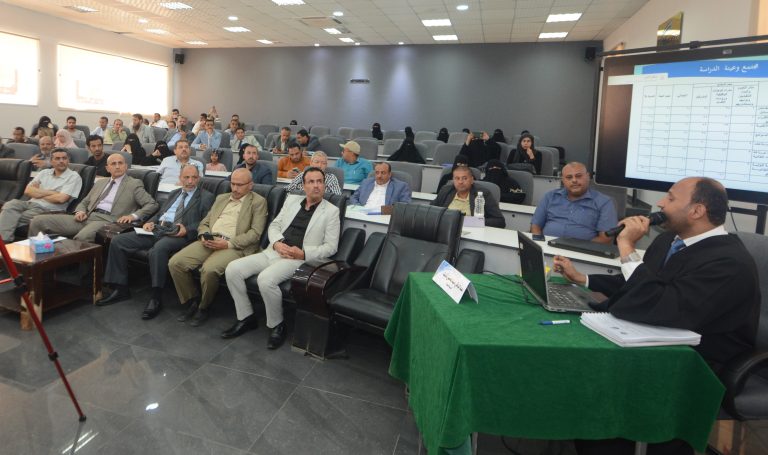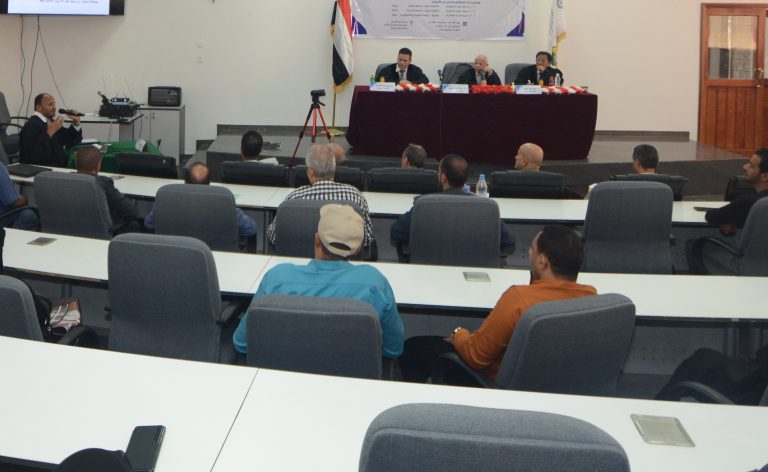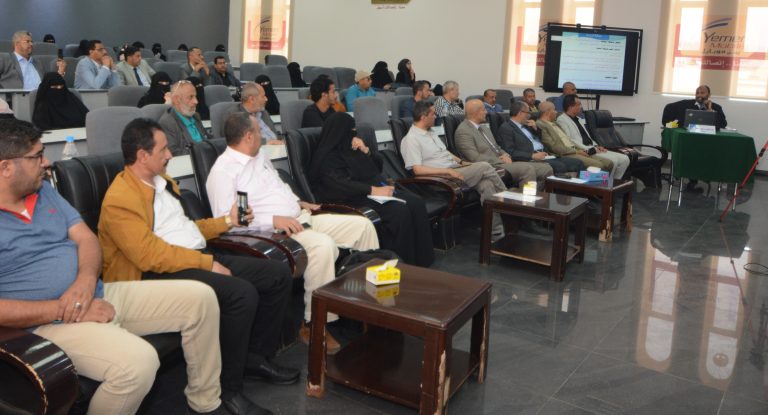مناقشة اطروحة الدكتوراة المقدمة من الباحث عبدالباقي عبدالمحسن محمد ثابت
انعقدت صباح يوم الاثنين 10/ 06/ 2024م مناقشة اطروحة الدكتوراة في مركز إدارة الاعمال للدراسات العليا -جامعة صنعاء والمقدمة من الباحث / عبدالباقي عبدالمحسن محمد ثابت ي ، والموسومة بعنوان: أثر ادارة المواهب على الاداء المنظمي من خلال الذكاء العاطفي : دراسة ميدانية في الشركات الصناعية بمحافظة الحديدة ” وتكونت لجنة الحكم والمناقشة من :
- ا.د / سنان غالب المرهضي مناقش داخلي – رئيساً
- ا.د / سيف سلام الحكيمي مناقش خارجي – عضواً
- ا.م.د/ عبده العامري مشرف – عضواً
وفي بداية المناقشة قام الباحث بعرض ملخص الأطروحة، ثم قام أعضاء اللجنة بمناقشة الباحث حول مضامين الاطروحة.
وعقب المناقشة أقرت اللجنة منح الباحث عبدالباقي عبدالمحسن محمد ثابت درجة الدكتوراه في فلسفة إدارة الأعمال،
ملخص الاطروحة
أثر إدارة المواهب على الاداء المنظمي من خلال الذكاء العاطفي: دراسة ميدانية في الشركات الصناعية بمحافظة الحديدة
الباحث: عبدالباقي عبدالمحسن محمد ثابت
المشرف: ا.م.د عبده العامري
هدفت هذه الدراسة إلى قياس أثر إدارة المواهب بأبعادها – جذب المواهب، تنمية وتطوير المواهب، الاحتفاظ بالمواهب، تحفيز المواهب – في الأداء المنظمي بأبعاده – البعد المالي، العملاء، العمليات الداخلية، التعلم والنمو- من خلال الذكاء العاطفي بأبعاده – الوعي بالذات، إدارة الانفعالات، التعاطف، المهارات الاجتماعية – في الشركات الصناعية بمحافظة الحديدة، واستخدم المنهج الوصفي التحليلي كمنهج للدراسة، وكان مجتمع الدراسة الإداريون العاملون في الشركات الصناعية بمحافظة الحديدة، وتم تطوير استبانة لجمع البيانات الأولية من أفراد عينة الدراسة، وبلغ حجم عينة الدراسة (212) فرداً كعينة عشوائية طبقية نسبية، يمثلون مجتمع الدراسة البالغ عدده (471) فرداً، واستخدم النموذجان التكويني والانعكاسي قي بناء نموذج الدراسة، وتم تحليل البيانات باستخدام برنامج الحزمة الإحصائية للعلوم الاجتماعية (SPSS) وبرنامج نمذجة المعادلة البنائية باستخدام المربعات الجزئية الصغرى (Smart-PLS-SEM)، واستخدام الأساليب الإحصائية الوصفية والاستدلالية للإجابة على أسئلة الدراسة وتحقيق أهدافها واختبار فرضياتها.
وتوصلت الدراسة إلى مجموعة من الاستنتاجات من أهمها:
وجود دور وسيط للذكاء العاطفي في العلاقة بين إدارة المواهب والأداء المنظمي في الشركات الصناعية، وجود دور وسيط لكل أبعاد الذكاء العاطفي في العلاقة بين إدارة المواهب والأداء المنظمي، ماعدا بعد إدارة الانفعالات، وجود أثر إيجابي لكل من إدارة المواهب والذكاء العاطفي في الأداء المنظمي في الشركات الصناعية، لا يوجد اختلاف في مستوى تحقق الأداء المنظمي في الشركات الصناعية حسب متغيري حجم المنظمة، وعمر المنظمة.
وقدمت الدراسة مجموعة من التوصيات من أهمها:
ضرورة تبني إدارة الشركات الصناعية تطبيق إدارة المواهب وتعزيز سلوكيات الذكاء العاطفي في شركاتهم كونهما من المواضيع الإدارية الحديثة التي تساهم في تحسين الأداء المنظمي في الشركات الصناعية.، إنشاء وحدة إدارية خاصة ضمن الهيكل التنظيمي للشركات الصناعية تهتم بممارسة وظائف إدارة المواهب مع تحديد المهام الأساسية للموهوبين وإعداد توصيف وظيفي لهم وإعداد استراتيجيات وسياسات وخطط لجذب الموهوبين وأصحاب المهارات والقدرات المتميزة وتطويرهم، قيام إدارات الشركات الصناعية بإعداد برامج ودورات تدريبية حول سلوكيات الذكاء العاطفي والتركيز على ترسيخه كأحد عناصر الثقافة المنظمية في الشركات الصناعية، واعتماد سلوكيات الذكاء العاطفي من ضمن معايير الاختيار والتعيين والترقية للموظفين في الشركات الصناعية.
الكلمات المفتاحية: إدارة المواهب، الأداء المنظمي، الذكاء العاطفي، الشركات الصناعية.
This study aimed to measure the impact of talent management in its dimensions—attracting talent, developing talent, retaining talent, and motivating talent—on organizational performance in its dimensions—the financial dimension, customers, internal processes, learning, and growth—through emotional intelligence in its dimensions—self-awareness and managing emotions. Empathy and social skills are important in industrial companies in Hodeida Governorate. The descriptive-analytical approach was used as a method for the study. The study population was administrators working in industrial companies in Hodeida Governorate. A questionnaire was developed to collect primary data from members of the study sample. The size of the study sample reached 212 individuals as a sample. Relative stratified randomization, representing the study population of 471 individuals. Formative and reflective models were used to build the study model. The data were analyzed using the Statistical Package for the Social Sciences (SPSS) program and the Structural Equation Modeling program using Partial Least Squares (Smart-PLS-SEM)., and using descriptive and inferential statistical methods to measure the objectives of the study and test its hypotheses. The study reached a set of conclusions, the most important of which are: There is a mediating role for emotional intelligence in the relationship between talent management and organizational performance in industrial companies. There is a mediating role for all dimensions of emotional intelligence in the relationship between talent management and organizational performance, except for the emotion management dimension. There is a positive effect of both talent management and emotional intelligence on organizational performance in companies. In industrial companies, there is no difference in the level of achieving organizational performance according to the variables of the size of the organization and the age of the organization. The study presented a set of recommendations, the most important of which are: It is necessary for the management of industrial companies to adopt the application of talent management and enhance emotional intelligence behaviors in their companies, as they are among the modern administrative topics that contribute to improving the organized performance of industrial companies. Creating a special administrative unit within the organizational structure of industrial companies concerned with applying talent management functions while identifying the basic tasks for the talented and preparing job descriptions for them and the preparation of strategies, policies, and plans to attract and develop talented people with distinguished skills and abilities. The departments of industrial companies prepare training programs and courses on emotional intelligence behaviors and focus on consolidating them as one of the elements of organizational culture in industrial companies and adopting emotional intelligence behaviors as one of the criteria for selecting, appointing, and promoting employees. In industrial companies.
Keywords: talent management, organizational performance, emotional intelligence, industrial companies.
صور المناقشة
فيديو لجانب من المناقشة
You may also like

الدكتوراة في فلسفة إدارة الأعمال للباحث فؤاد محمد حسين صالح ناجي

الدكتوراة في فلسفة إدارة الأعمال للباحث وليد الفلاحي





